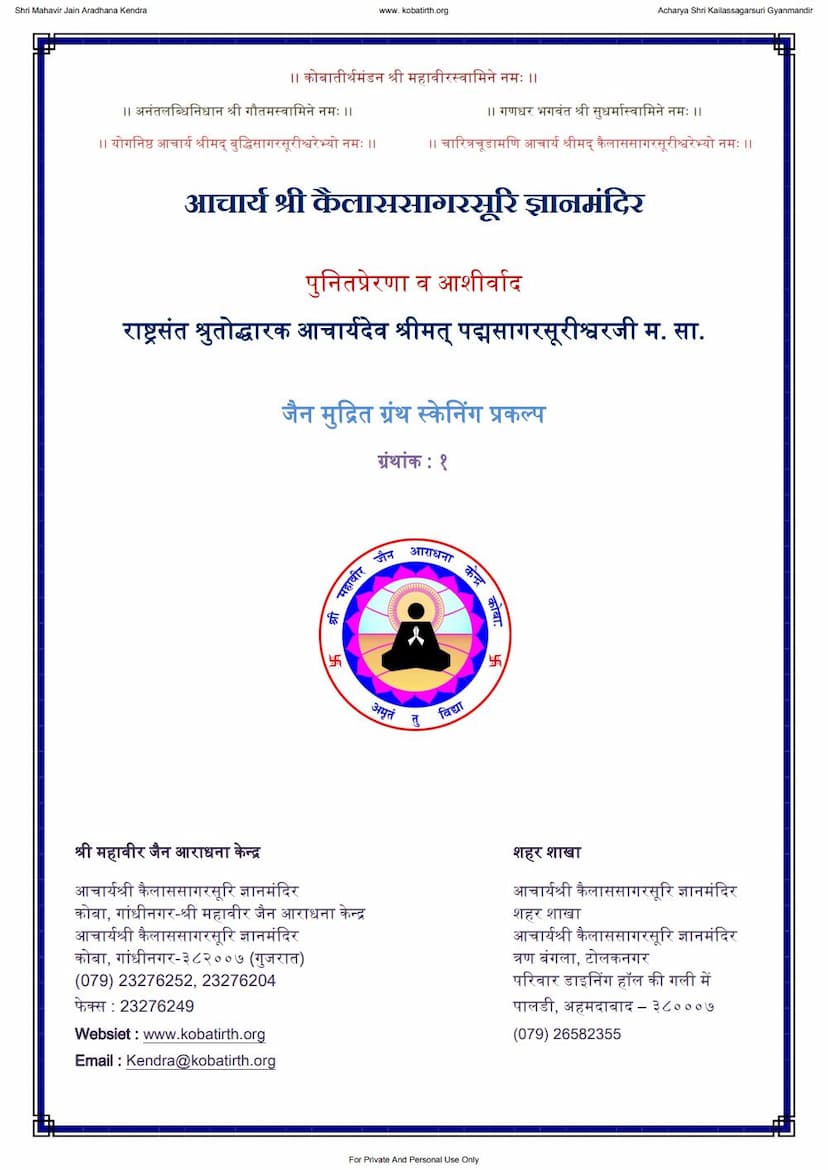Dankatha Arthat Vajrasen Charitra
Added to library: September 1, 2025

Summary
Here's a comprehensive summary of the Jain text "Dankatha arthat Vajrasen Charitra" by Bharamal Sanghai, based on the provided pages:
Title: Dankatha arthat Vajrasen Charitra (The Tale of Charity, also known as the Life of Vajrasen) Author: Bharamal Sanghai Publisher: Jain Bharti Bhavan, Kashi Publication Year: Veer Samvat 2452 (1926 CE)
This Jain scripture, "Dankatha arthat Vajrasen Charitra," authored by Bharamal Sanghai and published by Jain Bharti Bhavan Kashi, is a narrative that emphasizes the virtues of charity and the spiritual journey of its protagonist, Vajrasen. The text begins with invocations to respected Jain figures, including Lord Mahavir, Gautam Swami, and Acharya Buddhisagarsuri, setting a devotional tone.
The core of the text is a detailed account of Vajrasen's life, which serves as an illustrative example of the principles of dana (charity) in Jainism. The narrative unfolds by introducing the concept of charity as a fundamental virtue for worldly and spiritual well-being. It outlines four types of charity:
- Charity of Food (Ahar Dan): Providing sustenance.
- Charity of Medicine (Aushadhi Dan): Offering healing remedies.
- Charity of Knowledge (Shastra Dan): Sharing scriptures and wisdom.
- Charity of Fearlessness (Abhay Dan): Protecting life and offering refuge.
The story then shifts to the life of Vajrasen Kumar, the younger son of a wealthy merchant named Mahidhar in the city of Dharapur. Vajrasen and his elder brother, Maharseni, are sent to study. While Maharseni proves to be dull and unintelligent, Vajrasen is depicted as sharp, intelligent, and virtuous, quickly mastering his studies. This contrast highlights the importance of inherent qualities and diligent effort.
The narrative progresses to marriage arrangements. Vajrasen's younger brother is betrothed to a beautiful and virtuous daughter of a wealthy merchant named Somsen in Mahapuri. Meanwhile, the elder brother, Maharseni, is married to the daughter of a poor, foreign merchant. This arrangement is made by their father, Mahidhar, despite the disparity in status, possibly to test the sons or to fulfill a promise. The marriages are conducted with traditional festivities and generosity.
A significant portion of the text focuses on Vajrasen's unwavering commitment to Jain principles and his acts of charity. Despite facing adversities, including the misguided envy of his elder brother and the machinations of his brother's wife who attempts to poison him, Vajrasen consistently demonstrates compassion, adherence to dharma, and the practice of charity.
The story features a challenging situation where Vajrasen's wife is accused of stealing. The king, unable to discern the truth, consults Vajrasen. Through his wisdom and divine intervention (implied or aided by celestial beings), Vajrasen resolves the complex situation, demonstrating his upright character and dispensing justice.
The narrative also delves into the king's contemplation of renunciation and the consequences of actions. The king, influenced by witnessing injustice and the fleeting nature of wealth and power, eventually renounces his kingdom. He distributes his wealth, seeks forgiveness, and takes up the path of asceticism, ultimately achieving a divine state. This reinforces the Jain teachings on detachment from worldly possessions and the pursuit of liberation.
Throughout the story, Vajrasen's elder brother, Maharseni, and his wife are portrayed as envious and malevolent. They constantly plot against Vajrasen, trying to harm him through poison, deceit, and attempts to discredit him. However, Vajrasen's inherent virtue, the grace of divine intervention, and the karmic repercussions of his enemies' actions thwart their plans. The elder brother's misdeeds ultimately lead to his downfall and punishment, including expulsion from the kingdom and suffering in hell.
The text then describes the king's eventual realization and respect for Vajrasen's character and wisdom. Recognizing Vajrasen's inherent merit and the purity of his actions, the king reinstates him, granting him the position of minister and later the throne. Vajrasen, true to his compassionate nature, forgives his elder brother and even brings him back to the kingdom, demonstrating the power of forgiveness and the ability to elevate others through virtuous conduct.
The narrative concludes by emphasizing the profound significance of charity in leading to a life of prosperity, honor, and ultimately, spiritual attainment. Vajrasen's life is presented as a testament to the rewards of practicing dana and living a life of dharma, leading him through various stages of life, including divine births, and ultimately towards liberation.
The text is written in a poetic, devotional style, characteristic of classical Indian religious literature, aiming to inspire readers to cultivate virtues like charity, compassion, and righteousness. The inclusion of specific examples of righteous acts and their consequences serves as a moral and spiritual guide for the followers of Jainism.